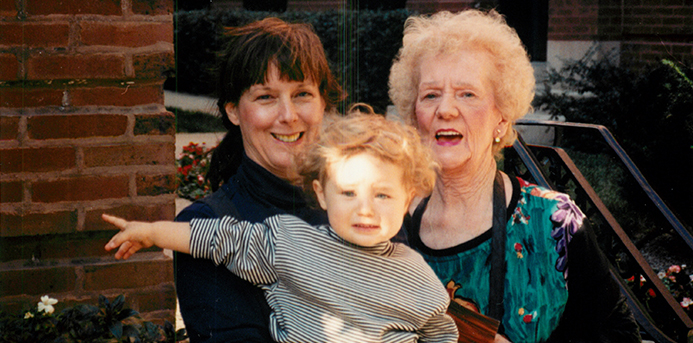With a young daughter, a busy career involving substantial travel and a working husband, Jan Tratnik didn’t believe that she had the bandwidth to also become the primary caretaker of her mother who developed early-onset Alzheimer’s. Nor did Tratnik anticipate that her vibrant, independent mother living in another state with an active social life would ever leave her home and let herself become dependent on another. But that is exactly what happened. For the last seven years of her mother’s life, Tratnik focused great attention and energy on caring for her mother during her relentless descent into “living death and unenviable demise.”
The real surprise, though, turned out to be how much Tratnik enjoyed and benefited from this caretaking journey. That her mother didn’t even recognize Tratnik during the last five years didn’t stop Tratnik from enjoying their outings to places like the Chicago Botanic Garden, continuously declaring her love and promising to be her mother’s memory.
“I never thought I would give of myself to that extent,” Tratnik explains. “But a large chunk of my life became caregiving and feeling a higher purpose. This took our relationship to a deeper level. It got better.”
The disease also had a profound impact on Tratnik’s daughter. “Kamryn was madly in love with my mother, as is common between grandchild and grandparent,” she says. “When she was about 10, the decline became noticeable, though.”
“Kamryn was devastated when her grandmother looked at her and asked, ‘Who is this girl?’” Though Kamryn was stoic at home, her teacher reported profound sadness at school. That her daughter couldn’t share her hurt and anger with her saddened Tratnik.
Turning to the Alzheimer’s Association
When the disease finally took her mother’s life, Tratnik felt a great void. Soon afterward, she attended an Alzheimer’s Association gala as a corporate social responsibility representative through her employer at the time. Tratnik found herself at a table surrounded by others recovering from similar experiences, and it felt good.
Most caretakers are too busy while their loved one is alive to seek help from Alzheimer’s Association. Instead, they find their way to the organization after the Alzheimer’s sufferer dies. Like others at her table that night, Tratnik eventually became deeply involved in the organization — fighting to raise awareness, provide support for families suffering through the ravages of this vicious disease, and, ultimately, find a cure — all in honor of her mother.
Tratnik eventually joined the Alzheimer’s Association board. This, too, became a bonding experience, as 90 percent of the board members have lost a family member to the disease. “We care for each other,” she proudly declares. She may now be the board’s primary caretaker, too, as she is currently its chair.
In loving memory of her grandmother, Kamryn started volunteering with Alzheimer’s Association as well, and hopes to serve at a senior living facility near her college, Washington & Lee.
Alzheimer’s By the Numbers
While much is still unknown about this insidious disease, 2014’s “Still Alice” (which earned Julianne Moore an Academy Award for her role as Alice Howland, the title character affected by early-onset Alzheimer’s) raised substantial awareness.
“Alzheimer’s is what cancer was 30 years ago,” Tratnik says. “When there was such a stigma that it was only called ‘the c word,’ but that’s changing as awareness and understanding grows. ” The Alzheimer’s Association is on a mission to grow this awareness and understanding, as well as raise money to expedite finding a cure and help families already hit by the disease.
For some unknown reason, women are hit harder than men. Almost two-thirds of American Alzheimer’s patients are women. Women are also predominantly the primary caregivers for Alzheimer’s patients. As our population lives longer, the number of us affected by Alzheimer’s will continue to grow.
“One thing is known,” Tratnik says, “the disease can be inherited.” This provides another compelling reason for Tratnik and her daughter to make as great an impact now as they can.
How You Can Help
You can help fight Alzheimer’s by supporting the Alzheimer’s Association through its popular walks throughout the state during the summer or by attending one of the three local Reason to Hope luncheons in April. CBS 2 Chicago’s Irika Sargent is the emcee of the North Shore luncheon.
Make It Better is proud to be a media sponsor of several of these events.
More from Make It Better:

